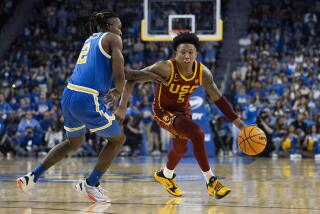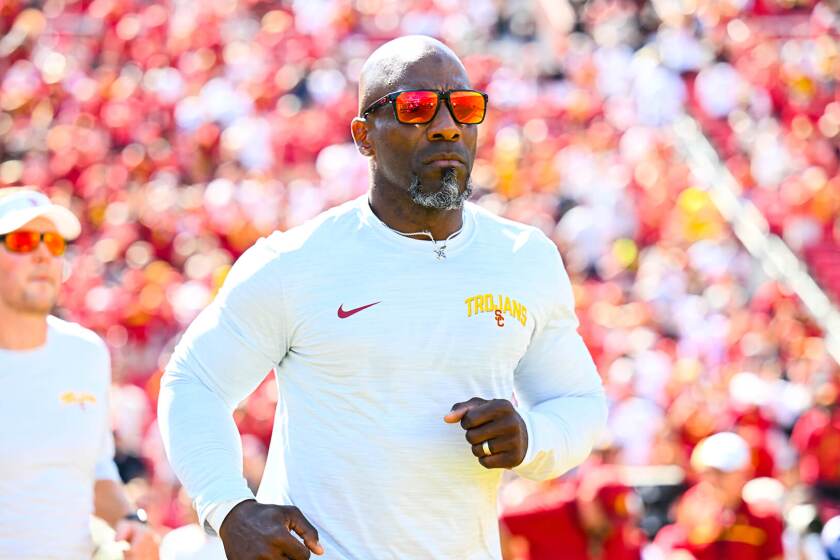USC’s Apolskis to Begin Chemotherapy : College football: Sophomore center is suffering from testicular cancer. His prognosis is favorable.
- Share via
David Apolskis, a starter at center in six games for the USC football team last season, will begin chemotherapy treatments for testicular cancer Thursday at USC’s Kenneth Norris Jr. Cancer Hospital.
A sophomore from Houston, Apolskis has not played for the Trojans this season.
His cancer was diagnosed on Aug. 8, two days before the Trojan veterans reported for practice, and he had a testicle removed that day in an operation at Centinela Hospital Medical Center.
Three weeks later, on Aug. 29, Apolskis had cancerous abdominal lymph nodes removed at the Kenneth Norris Jr. Cancer Hospital.
He is scheduled to receive four weekly chemotherapy treatments, but it is possible that he could need additional treatments, Dr. Chester Semel said.
Semel said that Apolskis has a “98% chance for cure” and should be able to play again.
“He seems to have tolerated everything quite well,” Semel said. “The outlook is very encouraging.”
USC had originally announced that Apolskis was sidelined after “abdominal surgery.” Within the last two weeks, Apolskis told the school’s sports information office that he was ready to discuss his condition.
“A little bit of it is still hitting me, but the trauma part was probably over the week after the first surgery,” Apolskis told reporters Tuesday.
“Right after the first surgery, I was really scared because when I came out . . . they told me it was a tumor. The first thing I thought was, ‘I’m going to die.’ It scared me to death.
“After about a week or so of learning about the cancer and what it was--and how common it was in men my age--I really wasn’t scared any longer. I had to be optimistic, and I have beenever since. I know it’s curable.”
According to the American Cancer Society, about 6,100 cases of testicular cancer will be diagnosed in the United States this year, meaning it will affect about one in 20,000 American males.
About 375 men will die from it in the United States this year, the society said.
Apolskis said that he first experienced a sharp, shooting pain in his abdomen about three weeks before his surgery.
“But it was off and on and I didn’t really report it to anybody because it wasn’t constant pain,” he said. “I thought maybe I just got hit or something and nothing was really wrong.
“It wasn’t until the week before practice started that I finally told the trainers, ‘Something is wrong with me.’ They sent me over to see our doctors and they immediately sent me over to Centinela.”
Four hours after reporting to USC trainers, Apolskis was in surgery.
If not treated, “it would ultimately spread and cause death,” Semel said of the cancer.
“The earlier it’s removed, the safer it is. His was (diagnosed) fairly early.”
A second-team freshman All-American last season, Apolskis said that he is determined to play again. He registered for classes about two weeks late this fall and is taking three classes.
“I’m not sure how long it’s going to take before I can play, but being out there watching the Penn State game, I knew I wanted to play again,” he said.
“But I know how grueling and tough it’s going to be to get myself back into playing shape, or (figuring out) where I’m going to have to play.”
The 6-foot-4 Apolskis has lost about 30 pounds since his condition was diagnosed and now weighs about 230 pounds.
“I’ve already started riding the (stationary) bike and exercising a lot more than they originally thought I could,” he said.
“I don’t know (in) what capacity I could come back. I don’t know if I want to put on 30 more pounds again. I feel really good. Whatever capacity I could come back in to help the team, I’d love to do it.
“I don’t know what it’s going to be right now, but I’m sure I could help in some way.”
He is apprehensive about starting chemotherapy treatments.
“I’m a little bit scared,” he said. “You’re always going to be scared of something you’ve never done before. It’s scary to think of what I’m going to have to go through--the nausea and everything else. It’s just kind of scary.
“But Dr. (Christy) Russell has convinced me I’m going to be fine. She said, ‘After you’ve had two surgeries and been through all that pain, this is going to be easy.’ ”
More to Read
Go beyond the scoreboard
Get the latest on L.A.'s teams in the daily Sports Report newsletter.
You may occasionally receive promotional content from the Los Angeles Times.





